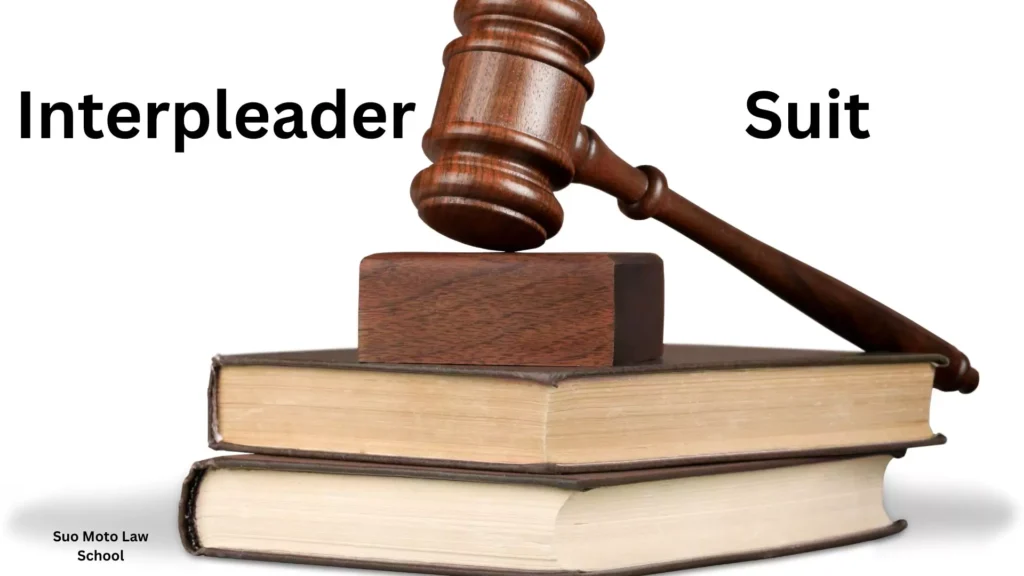Introduction
In a general sense, suits are instituted for disputes between the plaintiff and the defendant. Sometimes, real disputes arise between the defendants. Here, the plaintiff has no interest. In other words, it can be said that the plaintiff has no interest other than for charges or costs in the subject matter (Interpleader suit). Primarily, this type of suit arises when two or more persons claim ownership of something from another person, and the person has no claim to that thing, and is also willing to deliver it to the rightful claimant. When another person institutes a suit against those claimants, this is called an interpleader suit.
Definition
An interpleader suit is a suit where the real dispute is between the defendants only, and the defendants plead against each other instead of pleading against the plaintiff.
Interpleader Suits under the Code of Civil Procedure, 1908
Matters relating to interpleader suits are governed by Section 88 of The Code of Civil Procedure, 1908, and Order 35 of the same Act. According to Section 88, where two or more persons claim adversely to one another the same debt, sum of money or other property whether it is movable or immovable in nature from another person, who claims no interest therein other than for charges or costs and who is ready to pay or deliver it to the rightful claimant.
Such other person may institute a suit of interpleader against all the claimants to obtain a decision as to the person to whom the payment or delivery shall be made and obtain indemnity for himself. Where any suit is pending in which the rights of all parties can properly be decided, no such suit of interpleader shall be instituted.
Conditions for Instituting an Interpleader Suit
- There must be the same debt, sum of money, or other property, whether movable or immovable in nature, in the dispute.
- Two or more persons must be claiming it adversely to one another.
- The person from whom such debt, sum of money, or other property is claimed must not claim interest therein other than charges and costs. Such a person must be ready and willing to pay or deliver the debt, some of the money, or property claimed by the rightful claimant.
- There must be no suit pending wherein the rights of rival claimants can be properly adjudicated.
Plaint in Interpleader Suits
In case of instituting an interpleader suit, in addition to other statements necessary, the plaint shall also contain that —
- The plaintiff claims no interest in the subject matter in dispute other than for charges or costs.
- The claims made by the defendants severally, and
- There is no collusion between the plaintiff and any of the defendants.
Where the thing claimed is capable of being paid into Court or placed in the custody of the Court, the plaintiff has to pay or place the thing before the Court. If any of the defendants are actually suing the plaintiff in respect of the subject matter of such suit, the Court in which such suit is pending shall, on being informed by the Court in which the interpleader suit has been instituted, stay the proceedings as against the plaintiff.
Procedure at First Hearing
At the first hearing of the suit, the Court may either declare that the plaintiff is discharged from all liability to the defendants in respect of the thing claimed, award him his costs, and dismiss him from the suit or if it thinks that justice or convenience so require, retain all parties until the final disposal of the suit.
Where the Court finds that the admissions of the parties or other evidence enable it to do so, it may adjudicate the title to the thing claimed. Where the evidence and admissions of the parties do not enable the Court to adjudicate, it may frame issues between the parties and try. Any claimant can be made a plaintiff in lieu of or in addition to the original plaintiff, and shall proceed to try the suit in the ordinary manner.
Agents and Tenants may not Institute Interpleader Suits
A tenant and agent can’t compel their landlord or principal to interplead with any person other than the person making a claim through such principal or landlord.
For example, A deposits a box of jewels with B as his agent. C alleges that the jewels were wrongfully obtained from him by A and claims them from B. However, B cannot institute an interpleader suit against A and C.
Conclusion
Interpleader suits are primarily instituted to return the disputed item to its rightful owner. It is worth noting that the plaintiff has no interest in the disputed item and is willing to return it. Where the suit is properly instituted, the Court may provide for the costs of the original plaintiff by giving him a charge on the thing claimed or in some other effectual manner.

